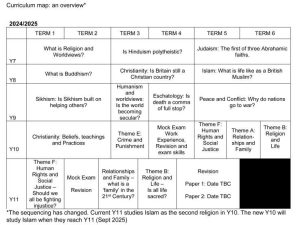
Intent
At Branston Community Academy we believe it is vital for all students to study Religion and Worldviews. Our Academy’s ethos is ‘kindness or nothing’ and the Religion and Worldviews department plays a fundamental role in ensuring students have the awareness, skills, and qualities to carry this ethos with them for the whole of their lives. The subject has three ‘lenses’ through which we can see this subject: Theology (believing), Philosophy (thinking) and Ethics (Living). At BCA, we deliver all three through a non-dogmatic approach.
The RE and worldviews departments at Branston is committed to one key intent: to provide a curriculum that allows for our students to leave the academy as tolerant and caring individuals, ready for life in a pluralist society
Students will have opportunities to:
- Develop their knowledge of Christianity (as the historical faith of the UK) as well as other principal religions and world views.
- Show mutual respect and acceptance of other beliefs, values and traditions
- Develop the ability to understand the faith or belief of individuals and communities and see how these may shape their culture, community or behaviour
- To aspire to achieve not just in terms of their academic qualifications, but their own personal spiritual, moral, social and cultural development as well.
- Asking relevant and increasingly deep questions using a range of sources and evidence, and reflecting on the ‘big questions’ raised during the lesson.
- Develop the skills to analyse and evaluate information so they are able to articulate a supported opinion/belief
Implementation
Teachers of Religion, Ethics and Worldviews will:
- Provide an appropriate enquiry driven learning environment; allowing students to ask questions and to seek understanding.
- Use a range of questioning to challenge students on their understanding of theological, philosophical and ethical and wider social issues.
- Facilitate safe spaces for discussions that allow students to reflect on their own experiences, beliefs, and values whilst building up resilience.
- Deliver a broad and balanced curriculum through a chronological* investigation of religion and worldviews covering Theology (believing), philosophy (thinking) and Social Sciences (living).
- Provide regular whole class and individual verbal feedback, in the lessons to give students instant opportunities to make progress in their work.
Impact
We know students are succeeding and making progress because:
- Through a combination of summative and formative assessment, students will be able demonstrate their knowledge and understanding, in line with their pathway.
- Various students will contribute to in-class discussion through a combination of volunteering responses, or being chosen.
- When contributing to discussions, students will show empathy and consideration of different religious and non-religious views maintaining respect for all those in our various
- Students will have an awareness of the place of Religion and Ethics on the curriculum.
- There will continue to be a good uptake of the A-level in Religious Studies, as students will have ambition and aspiration to continue their studies in the subject.
Curriculum Time:
- Students in Y7, Y8 , Y9 and Y11 one, 62-minute lesson of RE and Worldviews each week.
- In Y10 will have two doubles of RE and Worldviews each week.
- In KS5, non-statutory RE is currently delivered through Personal Development however, a new programme of study is currently being explored.

| Autumn | Spring | Summer | |
|---|---|---|---|
| Year 7 | What is Religion and Worldviews? | Is Hinduism monotheistic or polytheistic? | Judaism: The first of three Abrahamic faiths |
| Year 8 | What is Buddhism? | Christianity: Is Britain still a Christian country? | Islam: What is life like as a British Muslim? |
| Year 9 | Sikhism: is Sikhism built on helping others? | Humanism and Worldviews: Is the world becoming more secular? Eschatology: Is death a comma or full stop? | Peace and Conflict: Why do nations go to war? |
| Autumn | Spring | Summer | |
|---|---|---|---|
| Year 10 | Christianity: Beliefs, teachings and Practices | Theme E:Crime and Punishment. Mock Exam, Work Experience, Revision and exam skills | Theme A:Relationships and Family. Theme B:Religion and Life. Theme F:Human Rights and Social Justice. |
| Year 11 | Theme F:Human Rights and Social Justice – Should we all be fighting injustice? | Relationships and family: What is 'family' in the 21st Century? ThemeB:Religion and Life: Is all life sacred? | Revision and Exams |
KS5 Content:
Click the link below to view the curriculum map for KS5
Students will be given opportunities to:
- Study relationships between religion and culture;
- Consider moral values and attitudes of individuals, faith communities or contemporary society;
- Develop skill in reasoning on matters concerning values, attitudes and actions;
- Develop the ability to make responsible judgements on significant moral teaching and issues.
- Consider the quest for meaning in life, truth and ultimate values;
- Adopt an enquiring, critical and reflective approach to the study of religion, philosophy and ethics.
AS level in Religious studies
Philosophy of religion
Learners will study:
- Ancient philosophical influences
- The nature of the soul, mind and body
- Arguments about the existence or non-existence of God
- The nature and impact of religious experience
- The challenge for religious belief of the problem of evil
Religion and ethics
Learners will study:
- Normative ethical theories
- The application of ethical theory to euthanasia and business ethics
Developments in Christian thought
Learners will study:
- Religious beliefs, values and teachings, their interconnections and how they vary historically and in the contemporary world
- Sources of religious wisdom and authority
- Practices which shape and express religious identity, and how these vary within a tradition
A level in Religious studies
Philosophy of religion
Learners will study:
- Ancient philosophical influences
- The nature of the soul, mind and body
- Arguments about the existence or non-existence of God
- The nature and impact of religious experience
- The challenge for religious belief of the problem of evil
- Ideas about the nature of God
- Issues in religious language
Religion and ethics
Learners will study:
- Normative ethical theories
- The application of ethical theory to euthanasia and business ethics
- Ethical language and thought
- Debates surrounding the significant idea of conscience
- Sexual ethics and the influence on ethical thought of developments in religious beliefs.
Developments in Christian thought
Learners will study:
- Religious beliefs, values and teachings, their interconnections and how they vary historically and in the contemporary world
- Sources of religious wisdom and authority
- Practices which shape and express religious identity, and how these vary within a tradition
- Significant social and historical developments in theology and religious thought.
- Key themes related to the relationship between religion and society.
EXTRA CURRICULAR ACTIVITIES AND CLUBS
We encourage all students to participate in the extra-curricular programme we offer. Our clubs and activities are designed to be inclusive for all; the broad range on offer ensures that there is something for students of all ages, abilities and backgrounds to get involved with. We regularly review our offer to meet the ever-changing needs of our students.
The extra-curriculum clubs and activities for the current (and previous) academic term can be found by visiting the link below.

